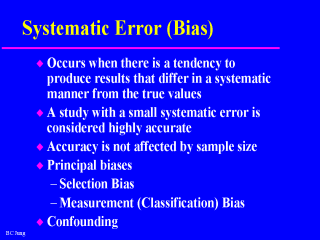| front |1 |2 |3 |4 |5 |6 |7 |8 |9 |10 |11 |12 |13 |14 |15 |16 |17 |18 |19 |20 |21 |22 |23 |24 |25 |26 |27 |28 |29 |30 |review |
 |
Systematic error is a
major problem with epidemiological studies because epidemiologists usually have no control
over participants in studies. It is also difficult to obtain representative samples of the
populations of interest. Also, some variables of interest are difficult to measure, and then there are environmental conditions to consider. There are about 30 specific types of bias that can result from systematic error in research design. The two main ones are selection and measurement biases. Misleading estimates of effect can result from confounding. Though not a bias, per se, it is a result of the non-random distribution of risk factors in the source and study populations. |